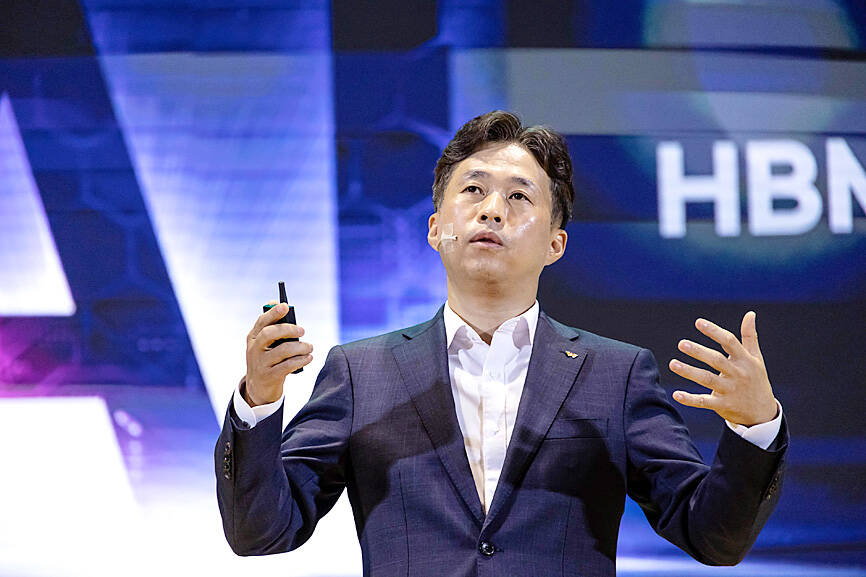The head of artificial intelligence (AI) computing giant Nvidia Corp asked South Korea’s SK Hynix Inc to speed up delivery of newer, more advanced HBM4 chips by six months, SK Group said yesterday.
Nvidia chief executive officer Jensen Huang (黃仁勳) made the request amid a global shortage of crucial advanced chips, which SK Hynix has pledged to work on with fellow market leader Taiwan Semiconductor Manufacturing Co (台積電).
SK Hynix, the world’s second-largest memorychip maker, is racing to meet explosive demand for the high-bandwidth memory (HBM) chips that are used to process vast amounts of data to train AI, including from Nvidia, which dominates the market.

Photo: Bloomberg
“The current pace of HBM memory technology development and product launches is impressive, but AI still requires higher-performance memory,” Huang said by video link at an AI summit in Seoul.
Last month, SK Hynix said that it was on course to deliver the 12-layer HBM4 chips by the second half of next year.
SK Hynix yesterday said that it would ship samples of the first-ever 16-layer HBM3E chips by early next year, as it seeks to bolster its growing AI chip dominance.
“Nvidia is demanding more HBM as it releases better chip versions every year,” SK Group chief executive officer Chey Tae-won said.
It was a “happy challenge” which kept the company busy, he added.
The company said it was mass-producing the world’s first 12-layer HBM3E product in September, and aims to ship samples to clients of the newer, more advanced products quickly.
The additional layers add more bandwidth speed, power efficiency and improve the total capacity of the chips.
“SK Hynix has been preparing for various ‘world first’ products by being the first in the industry to develop and start volume shipping,” SK Hynix CEO Kwak Noh-jung said.
“SK Hynix has been developing 48GB [gigabyte] 16-high HBM3E in a bid to secure technological stability and plans to provide samples to customers early next year,” he added.
In 2013, SK Hynix launched the first HBM chips — cutting-edge semiconductors that enable faster data processing and the more complex tasks of generative AI.
Rival Samsung Electronics Co has been lagging behind SK Hynix when it comes to HBM chips, and the market capitalization gap between Samsung Electronics and SK Hynix reached its narrowest level in 13 years last month.
SK Hynix’s shares yesterday rose 6.48 percent, while Samsung Electronics increased 0.69 percent.

In Italy’s storied gold-making hubs, jewelers are reworking their designs to trim gold content as they race to blunt the effect of record prices and appeal to shoppers watching their budgets. Gold prices hit a record high on Thursday, surging near US$5,600 an ounce, more than double a year ago as geopolitical concerns and jitters over trade pushed investors toward the safe-haven asset. The rally is putting undue pressure on small artisans as they face mounting demands from customers, including international brands, to produce cheaper items, from signature pieces to wedding rings, according to interviews with four independent jewelers in Italy’s main

Japanese Prime Minister Sanae Takaichi has talked up the benefits of a weaker yen in a campaign speech, adopting a tone at odds with her finance ministry, which has refused to rule out any options to counter excessive foreign exchange volatility. Takaichi later softened her stance, saying she did not have a preference for the yen’s direction. “People say the weak yen is bad right now, but for export industries, it’s a major opportunity,” Takaichi said on Saturday at a rally for Liberal Democratic Party candidate Daishiro Yamagiwa in Kanagawa Prefecture ahead of a snap election on Sunday. “Whether it’s selling food or

CONCERNS: Tech companies investing in AI businesses that purchase their products have raised questions among investors that they are artificially propping up demand Nvidia Corp chief executive officer Jensen Huang (黃仁勳) on Saturday said that the company would be participating in OpenAI’s latest funding round, describing it as potentially “the largest investment we’ve ever made.” “We will invest a great deal of money,” Huang told reporters while visiting Taipei. “I believe in OpenAI. The work that they do is incredible. They’re one of the most consequential companies of our time.” Huang did not say exactly how much Nvidia might contribute, but described the investment as “huge.” “Let Sam announce how much he’s going to raise — it’s for him to decide,” Huang said, referring to OpenAI

The global server market is expected to grow 12.8 percent annually this year, with artificial intelligence (AI) servers projected to account for 16.5 percent, driven by continued investment in AI infrastructure by major cloud service providers (CSPs), market researcher TrendForce Corp (集邦科技) said yesterday. Global AI server shipments this year are expected to increase 28 percent year-on-year to more than 2.7 million units, driven by sustained demand from CSPs and government sovereign cloud projects, TrendForce analyst Frank Kung (龔明德) told the Taipei Times. Demand for GPU-based AI servers, including Nvidia Corp’s GB and Vera Rubin rack systems, is expected to remain high,